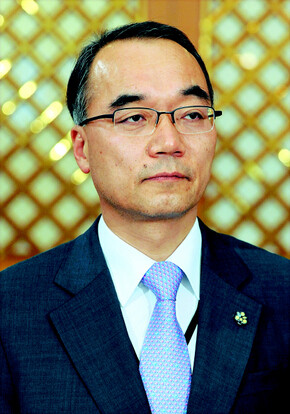hankyoreh
Links to other country sites 다른 나라 사이트 링크
KBS president should be in line with the govt’s views, Blue House aide says

Bahk Jae-wan, the senior presidential aide for national policy planning, said, “Although the neutrality of broadcasting needs to be taken into account, as the head of a government-affiliated organization, (the KBS president) should have the will to actively realize the new administration’s policy agenda,” which could be interpreted to mean that “the editorial tone of public broadcasters should be in line with the government.” The remark comes in the midst of increased attempts by the administration of Lee Myung-bak to take control of the broadcast media and is expected to stir up a controversy about the neutrality of broadcasters.
In an interview with the monthly magazine “Shindonga,” published on July 18, Bahk said that, in the case of the KBS president, “a process is needed to verify whether he or she is the most qualified to meet the demands of the new era” and earn the government’s trust.
In a telephone interview with The Hankyoreh later that day, Bahk said, “I think it’s appropriate for (the president of) KBS to go through a verification process. KBS is a government-affiliated organization. Still, is it okay for a government-affiliated organization to have a different view than the government on how the administration is managed?” Bahk said. “The government has changed. Isn’t it natural that (the heads of government-affiliated organizations) be confirmed as the most qualified to implement the philosophy of the current administration and (earn the trust of the president) again?”
Regarding KBS President Jung Yun-joo, Bahk said, “Under the principles of moral justice, I think it’s desirable for him to step down.”
However, media scholars and civic organizations have accused Bahk of “undermining the independence and neutrality of media.”
Choi Young-mook, a media professor at SungKongHoe University, said that Bahk had “confused the difference between a state-run and a public broadcaster. Though the president has the power to appoint the KBS president, KBS went from being a state-run broadcaster to a public broadcasting company in 1972. In addition, consolidated broadcasting laws in 2000 ban the government from intervening in KBS’s programming and editorial tone.” Choi added, “While the British prime minister appoints the president of public broadcaster BBC, the BBC president’s term is guaranteed and the BBC is independent from the government. Monitoring the government is one of the media’s core functions. If the president of a public broadcaster is changed and its editorial tone affected in line with a change of political power, as Bahk said, the public broadcaster’s reports about the government will lose the viewers’ trust.”
Under current laws, KBS is not a “government-affiliated organization.” According to the Act on the Operation of Public Organizations, a government-affiliated organization is an organization for which the government raises funds or pays operational costs annually. However, KBS is not designated as a government-affiliated organization under the Broadcasting Law.
Please direct questions or comments to [englishhani@hani.co.kr]
Editorial・opinion
![[Column] Park Geun-hye déjà vu in Yoon Suk-yeol [Column] Park Geun-hye déjà vu in Yoon Suk-yeol](https://flexible.img.hani.co.kr/flexible/normal/500/300/imgdb/original/2024/0424/651713945113788.jpg) [Column] Park Geun-hye déjà vu in Yoon Suk-yeol
[Column] Park Geun-hye déjà vu in Yoon Suk-yeol![[Editorial] New weight of N. Korea’s nuclear threats makes dialogue all the more urgent [Editorial] New weight of N. Korea’s nuclear threats makes dialogue all the more urgent](https://flexible.img.hani.co.kr/flexible/normal/500/300/imgdb/original/2024/0424/7317139454662664.jpg) [Editorial] New weight of N. Korea’s nuclear threats makes dialogue all the more urgent
[Editorial] New weight of N. Korea’s nuclear threats makes dialogue all the more urgent- [Guest essay] The real reason Korea’s new right wants to dub Rhee a founding father
- [Column] ‘Choson’: Is it time we start referring to N. Korea in its own terms?
- [Editorial] Japan’s rewriting of history with Korea has gone too far
- [Column] The president’s questionable capacity for dialogue
- [Column] Are chaebol firms just pizza pies for families to divvy up as they please?
- [Column] Has Korea, too, crossed the Rubicon on China?
- [Correspondent’s column] In Japan’s alliance with US, echoes of its past alliances with UK
- [Editorial] Does Yoon think the Korean public is wrong?
Most viewed articles
- 1‘We must say no’: Seoul defense chief on Korean, USFK involvement in hypothetical Taiwan crisis
- 2N. Korean delegation’s trip to Iran shows how Pyongyang is leveraging ties with Moscow
- 3‘Weddingflation’ breaks the bank for Korean couples-to-be
- 4Will NewJeans end up collateral damage in internal feud at K-pop juggernaut Hybe?
- 546% of cases of violence against women in Korea perpetrated by intimate partner, study finds
- 6[Column] Park Geun-hye déjà vu in Yoon Suk-yeol
- 7“Parental care contracts” increasingly common in South Korea
- 8[Column] Yoon’s first 100 days should open our eyes to pitfalls of presidential system
- 9[Interview] Dear Korean men, It’s OK to admit you’re not always strong
- 10[Editorial] New weight of N. Korea’s nuclear threats makes dialogue all the more urgent